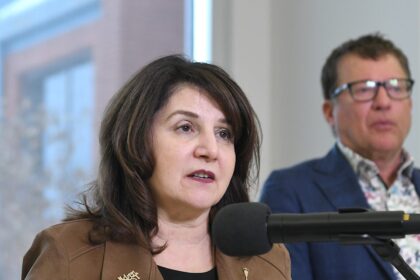Manitoba’s government wants the province to become “truly bilingual” — but exactly what that would look like is still a work in progress.The premier has said bilingualism could come with official status in the law, but some argue existing legislation is enough, and the focus should be on improving the delivery of services in French.However it’s done, Raïssa Bado looks forward to being able to easily access services in French.”I would like to be able to live in an environment where there is that value given to both of Canada’s official languages,” said Bado, a Winnipeg francophone.”I believe there is more that could be done to really make this province bilingual.”Bado moved to Manitoba from Ivory Coast in 2009 with the impression her mother tongue, French, was going to be enough to get basic services. But accessing health care, car insurance or daycare in French often comes with delays and sometimes is only available by appointment — if at all.Raïssa Bado, a francophone living in Winnipeg, says communicating in her mother tongue, French, is essential for some services, like health care, but that option is not always readily available. (Randall McKenzie/CBC)”It becomes a guessing game, or you have to make the decision: my needs, are [they] urgent enough that I can get it in English and work with that, or am I okay to wait so I can have the service in French?” Bado said.The choice to use English services comes with a cost — frustration, constant translation and the risk of misunderstandings, she said.”The need to accommodate people was always present,” she said. “For basic needs and services … people want to get that in the language of choice.”For her, it is also a matter of respect.”It’s not just a language. It’s a whole history, it’s a whole culture. We really want to keep it being part of Canada,” she said. “That’s kind of the dream.”Improving access of public services in French is one of the tasks laid out in Francophone Affairs Minister Glen Simard’s mandate letter.In June, the provincial government launched public consultations on how to make Manitoba a “truly bilingual province.” Asked by Radio-Canada what that would look like, Premier Wab Kinew said Manitoba bilingualism should be recognized in law, as in New Brunswick.Feasible to change — at least on paperFrench and English are enshrined in the Charter of Rights and Freedoms as the official languages of New Brunswick — the sole officially bilingual province in Canada.In the day-to-day, it means all public institutions in that province — including government agencies, Crown corporations and law enforcement — must offer their services in English and French within a reasonable amount of time, said Dominic Caron, a Fredericton-based lawyer whose legal practice includes work associated with language rights.”The courts have said many times, language rights are real rights, with real relief when they’re breached,” he said. Bilingualism is protected in New Brunswick by provincial legislation that ensures language guarantees prevail if they come into conflict with another law, Caron said. The possibility of choosing between French or English government services exists throughout the province.New Brunswick is Canada’s only officially bilingual province. English and French have equal status in that province under the Canadian Charter of Rights and Freedoms. (Julia Wright/CBC)Manitoba doesn’t have the same Charter protection or approach to the delivery of public services in French, said Guy Jourdain, the former executive director of the Association of French-Speaking Jurists of Manitoba. In Manitoba, the courts and the legislature operate in English and French, but other government services are offered in both languages in designated areas, where there are more francophones, the province says. Those areas are listed in the Bilingual Service Centres Act.Unlike in New Brunswick, in Manitoba, there is no clear indication that the government has “a legal obligation, a legal duty to actually provide [government] services” in both languages, Jourdain said.While it wasn’t clear from Kinew’s comments to what extent he wants Manitoba’s bilingualism to resemble New Brunswick’s model, Jourdain said it is feasible to achieve the same status — at least on paper.”Amending our provincial legislation would be much simpler, something that could be done by the Legislature of Manitoba within a matter of a few weeks,” he said.To include a constitutional right to the French language in Manitoba in the Charter, a resolution would need to be passed by the provincial legislature and both houses of Parliament.Unnecessary route Raymond Hébert, a political scientist and professor emeritus at St. Boniface University, said those options are unnecessary, because there is already legislation in Manitoba that regulates the use of French in government services — but the bill has mostly been underused.Under Manitoba’s Francophone Community Enhancement and Support Act, government bodies already need to have a multi-year plan to deliver public services in French. The implementation of bilingual policies is supposed to be monitored by the province’s Francophone Affairs Secretariat, while an advisory council created with the legislation should make recommendations on those plans.Hébert said the act has been sort of left on the shelf since it was enacted.Raymond M. Hébert, professor emeritus of political science at the University of St. Boniface, says the province’s legislation for the delivery of public services in French has been largely underused, and it would be a good starting point to improve bilingualism in Manitoba. (Radio-Canada)”We don’t know if plans are being enforced. We don’t know if there’s any monitoring going on,” he said. “Let’s start with that…. The government will have lots on its plate in terms of services and programs that could be implemented.”While there isn’t legislation that explicitly declares Manitoba bilingual, Hébert said the designation isn’t necessary if the province implements the legislation it already has to its fullest potential.If the province still wants an official designation, he hopes the government is considering what happened when Manitoba tried to increase language rights in the 1980s.Demonstrations and vandalism were seen in Winnipeg during the early 1980s, when people protested a provincial plan to grant Franco-Manitobans the constitutional right to get provincial government services in French. (Fonds La Liberté, SHSB95005/St. Boniface Historical Society Archives)At the time, the province announced its intention to seek an amendment to the Constitution and grant Franco-Manitobans the right to receive government services in French. Demonstrations were held and the Manitoba Francophone Society’s office was torched in an arson. “All hell broke loose,” Hébert said. “Passions were aroused on both sides.… Fortunately, there was no one injured or killed.”Manitoba’s society was really torn and divided…. I sincerely hope the Kinew government will take into account the possibility this could happen.”Staffing challenges Hébert said the political will of this government is all that’s needed to improve bilingualism.”At some point, the Constitution or even a law is limited in what it can force governments to do,” he said.From Jourdain’s perspective, making Manitoba “truly bilingual” means changing the model for the delivery of public services and expanding it beyond francophone regions that were established in the 1980s. “There has been a strong influx of French-speaking immigrants … and also with immersion schools, the number of people who are able to speak French fluently in Manitoba has increased considerably,” he said.The latest data from Statistics Canada says roughly 112,000 people in the province, or 8.4 per cent of the population, could hold a conversation in French in 2021. In 1991, roughly 98,800 people in the province could hold a conversation in French, Statistics Canada says.Staffing is one of the main hurdles to increasing service delivery, as the pool of bilingual professionals is limited compared to anglophones, Jourdain said.Manitoba Francophone Affairs Minister Glen Simard says the province is waiting to review the results of its consultations before publishing a strategy on bilingualism in March. (Gavin Boutroy/Radio-Canada)For example, in the Court of King’s Bench, there are no judges within the family division who can hear cases in French, Jourdain said, even though the province’s judicial branch should be bilingual.Minister Simard said more staff is always needed, and the province can do a better job of promoting bilingual opportunities in government.The province is waiting to review responses to consultations before publishing a strategy on bilingualism that will be released in March.But Simard said the road to making Manitoba truly bilingual starts with how government services are offered.”What I would like to see is folks being able to go out into their community, to grow up in their community in the official language of their choice,” he said.
Wednesday, 4 Feb 2026
Canada – The Illusion
Search
Have an existing account?
Sign In
© 2022 Foxiz News Network. Ruby Design Company. All Rights Reserved.
You May also Like
- More News:
- history
- Standing Bear Network
- John Gonzalez
- ᐊᔭᐦᑊ ayahp — It happened
- Creation
- Beneath the Water
- Olympic gold medal
- Jim Thorpe
- type O blood
- the bringer of life
- Raven
- Wás’agi
- NoiseCat
- 'Sugarcane'
- The rivers still sing
- ᑲᓂᐸᐏᐟ ᒪᐢᑿ
- ᐅᑳᐤ okâw — We remember
- ᐊᓂᓈᐯᐃᐧᐣ aninâpêwin — Truth
- This is what it means to be human.
- Nokoma











